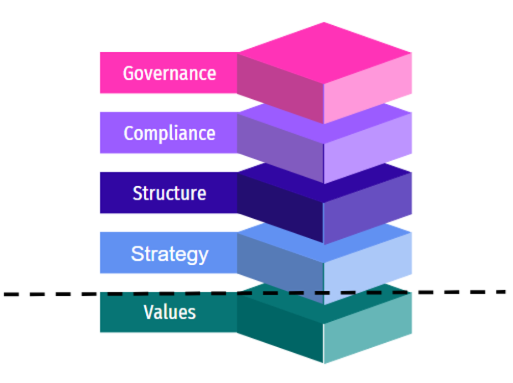
Unlocking the key to effective organisational governance
Have you ever wondered why some organisations struggle to establish a robust governance framework? The latest article by our HSLU lecturer, Dr Dimitrios Marinos, reveals one critical factor: the integration of corporate values. Find out how integrating values into governance practices shapes ethical decision-making, fosters stakeholder trust and cultivates a culture of accountability.
Shortcuts:
Intro | Ethics, transparency, integrity | Corporate values for social good
Info-Events | Programme Information | Contact

Dr Dimitrios Marinos, our lecturer at HSLU, has deep expertise in artificial intelligence, big data analytics, digital transformation, AI ethics, data governance and more.
Why corporate values play a crucial role
Corporate governance fails when it neglects to incorporate corporate values, because it undermines the ethical foundation that is essential for sustainable decision-making. Without the integration of guiding principles, governance mechanisms lack a moral compass, increasing the risk of ethical lapses, reputational damage and diminished stakeholder trust.
Corporate values play a crucial role in shaping an organisation’s governance framework and have a significant impact on its overall effectiveness. The impact of corporate values on governance is multifaceted and extends to various aspects of organisational behaviour, decision-making processes and stakeholder relationships.

Corporate values have a profound influence on governance, guiding organisations through the complexities of decision-making. These values, deeply embedded in the fabric of an organisation, have a transformative effect on governance practices. This essay explores the multifaceted impact of corporate values on governance, unravelling how shared principles shape ethical decision-making, stakeholder relationships and overall organisational sustainability.
Ethics, transpareny and integrity
At the heart of corporate values is an unwavering commitment to ethical behaviour, transparency and integrity. Aligning governance with these values empowers it to provide a robust framework for ethical decision-making, guiding organizations towards principled decisions. Ethical decision-making, underpinned by corporate values, becomes the linchpin of effective governance, fostering a culture of trust and accountability.
Aligning governance with corporate values lays the foundation for building trust between organisations and their stakeholders. Whether they’re customers, employees, investors or the wider community, stakeholders value authenticity and integrity. Governance practices that reflect an organisation’s values cultivate and sustain trust, thereby fostering a positive reputation. Trust acts as a currency that pays dividends in the form of loyalty, positive word-of-mouth and enduring stakeholder relationships.

The values shape an organization’s culture. When leadership reflects these values, they permeate the workplace and shape the behaviour of employees and leaders. A strong organisational culture based on shared values creates a sense of purpose and unity. When aligned with these values, governance transcends rules and regulations to shape a positive and ethical working environment as a guiding force.
Corporate values provide a benchmark against which to measure leadership accountability. Values-based governance holds leaders accountable for upholding ethical standards and staying true to the organisation’s mission. This accountability helps prevent leadership misconduct by ensuring that leaders embody transparency, accountability and responsible stewardship. Governance practices rooted in the company’s values create a culture synonymous with leadership integrity.
Sustainability, which encompasses the enduring success of an organisation, becomes a key consideration, guided by corporate values. Governance practices influenced by these values prioritise long-term sustainability over immediate gain. This perspective encourages strategic decision-making that considers the impact on stakeholders, the environment and society at large.
Values-based governance is forward-looking and contributes to organisational resilience and sustainable success. The impact of corporate values on employee engagement and retention is significant. Experiencing governance structures aligned with the organization’s values fosters pride and commitment among employees. Values-based leadership fosters a positive workplace culture that acts as a magnet for talent acquisition and retention. Employees become active participants in a shared journey guided by common values.
Corporate values for social good
Corporate values often include a commitment to social and environmental responsibility. Values-driven governance practices translate into responsible business conduct, ethical sourcing and sustainable practices. Values-based governance goes beyond the profit motive to consider the broader societal impact. This commitment enhances the organisation’s reputation and positions it as a positive force for social good.
Values have a transformative influence on governance, shaping the ethical climate, stakeholder relationships and overall sustainability of the organisation. Integrating values into governance structures and decision-making processes becomes the bedrock of responsible and principled leadership.
The lasting success of an organisation depends not only on financial acumen, but also on a values-driven approach to governance that makes a positive contribution to the world. Corporate values are no longer just words on paper; they become the cornerstones that support the pillars of ethical leadership and sustainable business practices.
We would like to thank Dr Dimitrios Marinos for his dedication in sharing these wonderful insights with us.
Data is the resource of the 21st century!
Register and join us for a free online Information-Event:
Monday, 11 August 2025 (Online, English)
Monday, 8 September 2025 (Online, German)
Monday, 6 October 2025 (Online, English)
Monday, 3 November 2025 (Online, German)
Programme Info: MSc in Applied Information and Data Science
More Field Reports & Experiences: Professional portraits & study insights
Frequently Asked Questions: FAQ


